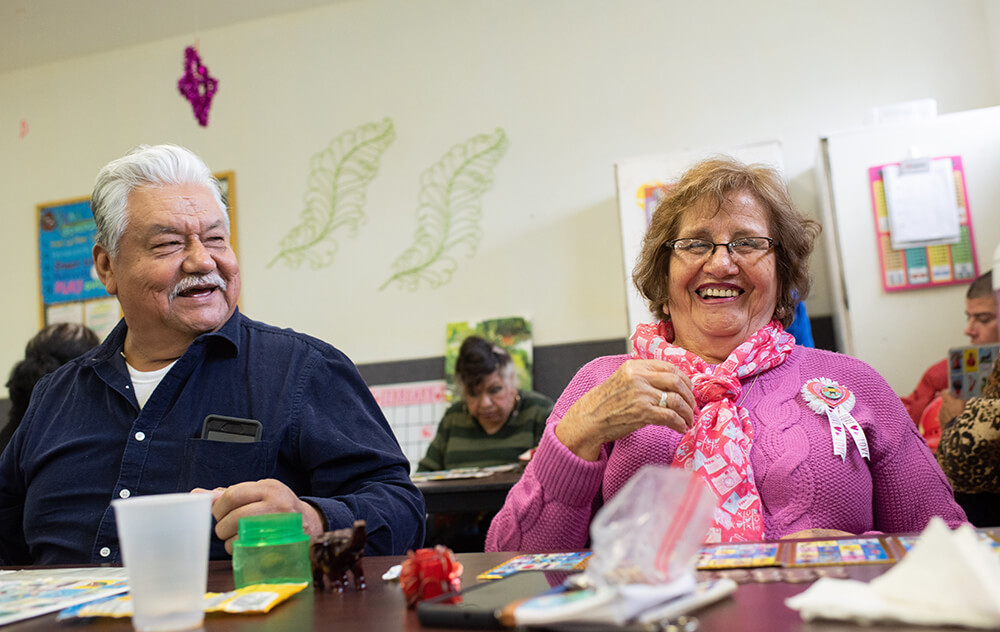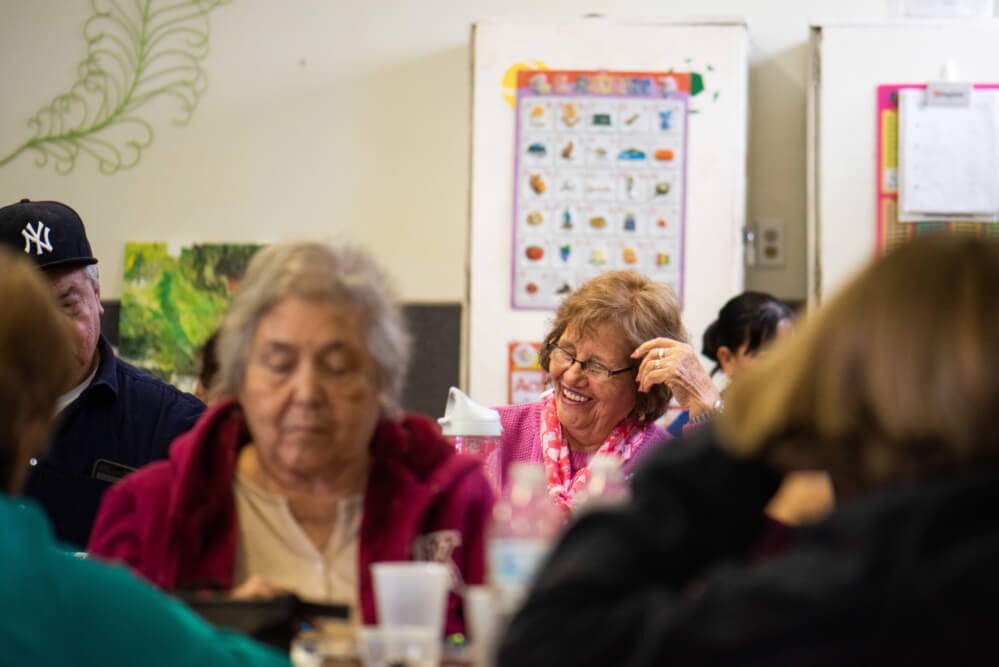
When her friend José invited her to play bingo, Irma Hernández, 74, happily accepted. That was two years ago, and they’re still playing every week. Last week, she won $25 in the big game.
When they call her winning number, both hands go up in the air. “Bingo!”
Everybody knows Irma.

She is just one of the many seniors at House of Neighborly Service, a nonprofit organization that provides child development, family support, senior health, and food security to families, adults, and children experiencing hardship in San Antonio’s West Side neighborhood.
Founded by Presbyterian Missionaries in 1917, the center has served the West Side community for more than a century. Today, the organization serves more than 150 families, many facing serious life challenges such as hunger, mental illness, and poverty. House of Neighborly Service is a current cohort member of the H. E. Butt Foundation’s Capacity Building program.
“Our clients are primarily Hispanic and low-income, and a lot of them live on an annual salary of $15,000,” says Sandra Morales, House of Neighborly Service’s executive director. “But you’d be amazed how a family can make that work.”
She’s not a fan of how people tend to view those living in poverty.
She concedes that it is possible to be poor by choice, “but often times it’s because of their status in society,” she says. “In spite of what the stereotype is or even the side of town we live on, there are people who are looking for opportunities to make their lives better. Just because they’re poor doesn’t mean they’re not smart and don’t want to be educated.”
Morales recalls a time when she felt trapped by low expectations.
“I became pregnant at 18,” she says. “Even when I got food stamps, I refused to stay on assistance. I remember sitting down with a caseworker to discuss a few options. She kept reminding me if I worked, I would lose my benefits.”
Morales becomes more animated as she remembers her story and why she’s so passionate about working on the West Side. “I love my community. I still live about 15 minutes from here,” she says.
When people come to House of Neighborly Service, they typically stick around for at least two or three years. That’s how long Hernández has been coming.
She takes two buses to make it to the center. She’s established a great network of friends who give her rides home and frequently call to check in.
For her, it’s so much more than bingo.
She recalls a time in her life when she struggled with depression and stayed in the house watching her Spanish soap operas.
“I wouldn’t do anything but cook, clean the house, and watch my novelas,” she says.
Originally from Coahuila, Mexico, Hernández taught herself to read and write in Spanish after her father pulled her out of school in the fourth grade. “My mom died when I was six, and my dad beat me every day,” says Hernández.
Her husband for 50 years was also physically abusive.
“He died seven years ago, and now that he’s gone, I have peace.”
In recent years, House of Neighborly Service has provided Hernández a safe space for healing and support. She no longer feels isolated. Now, she’s part of a close-knit group of seniors who enjoy spending time together. It’s become her second home.
In 2007, House of Neighborly Service established its senior health program for elderly neighbors, providing free lunches and jewelry making, sewing, and dancing classes.
Seniors receiving these services are also encouraged to get involved in some of the nonprofit’s other programs.
Libritos con Abuelitos—Books with Grandparents—is a child literacy program that launched in March 2019. Designed to bridge the gap between two generations—seniors and kids—the program focuses on teaching the rising generation how to read in English and Spanish.
Child literacy is a big issue in San Antonio. Many of the kids living in under-resourced neighborhoods don’t have access to books.
In neighborhoods where incomes tend to be high, the ratio of books per child is 13 to 1, while only one age-appropriate book is likely available for every 300 children in neighborhoods where incomes are low, according to the Children’s Book Bank.
Hernández, who has 12 great-grandchildren, none of them Spanish speakers, jumped at the opportunity to read to young kids in Spanish.
Sitting down with her hands crossed in her lap, Hernández smiles when talking about one reading buddy who captured her heart.
His name was Santiago, and he was three years old. She called him “Santi.”
“He loved reading and learning about whales,” she says. “He was very outgoing but would get embarrassed if I asked him a question. And he smiled a lot.”
Hernández looks forward to participating in the literacy program again, which is on hold until the completion of House of Neighborly Service’s new facility, scheduled to open sometime later this year.
The temporary pause in Libritos con Abuelitos hasn’t stopped her one bit. She still has a full schedule: chair yoga on Tuesday, bingo on Wednesday, and lunch and Zumba Fitness on Friday.
Thanks to House of Neighborly Service, she says, “I’m always laughing and having a good time.”
